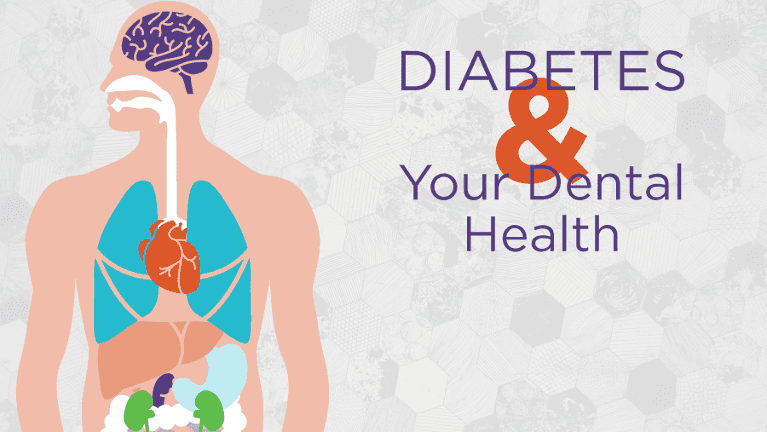
Over a long period of time, having uncontrolled diabetes and an elevated level of sugar in the blood can lead to various issues within the human body. We know that it can cause harm to the heart, the eyes, and the kidneys, but one area that needs to be considered more widely is the oral cavity. A person with diabetes compared to a person without, has a higher risk of dental problems and gum issues. This is attributed to a lower immune system decreasing your ability to fight these infections. Furthermore, your mouth may also take longer to heal.
How does diabetes affect my oral health?
Gum Disease (Periodontitis)
Your gums and surrounding bone are your teeth’s best friend and greatest support system. It enables your teeth to stay in place for you to eat and chew with ease. However, when bacteria and food debris build up as plaque, it can harden and transform into calculus. Plaque and calculus irritate the gums, causing them to become red and swollen. This build up will also cause halitosis (bad breath) and can sometimes lead to a bad taste in your mouth. If left unaddressed, this damage can transfer into the surrounding bone, eventually leading to wobbly teeth and tooth loss. Gum disease can occur in anyone, but if you have diabetes, it is easier for it to progress into the advanced stage. Although the bacteria are the same, your body’s inflammatory response is altered, so the risk of developing periodontal disease is greater. If you do develop periodontal disease, your response to treatment may also be reduced due to poor healing.
Fun fact: treating your gum disease can improve your blood glucose levels and as a result, you are able to respond better to dental treatments. Be sure to control both!
Dry Mouth (Xerostomia)
A decreased saliva flow commonly occurs in people with diabetes. This is due to high blood sugar levels, the condition’s affect to nerves that control saliva production, and using medications that have an adverse effect of dry mouth. Your natural saliva is extremely protective of both your gums and teeth, so when it's reduced, the risk of oral disease increases dramatically. There are measures we can suggest to help manage this condition.
Tooth Decay
People with diabetes tend to be more prone to dry mouth and increased glucose in the saliva. This leads to an increased risk for dental decay. The lack of saliva's natural protection and the sugar in the mouth allow plaque to feed and cause acid attack causing cavities. A further elevated risk is present in patients with existing periodontal disease with receded gums as the root surface is exposed, an area that is more prone to decay.
Oral Thrush (Candidiasis)
Oral Thrush, caused by an overgrowth of yeast that resides in the mouth, is a fungal infection that is more common in people with diabetes. It can cause uncomfortable creamy white or red patches that are sometimes ulcerated and seen often on the tongue or inside of the cheeks. Regular checks can allow your dentist to identify oral thrush and prescribe antifungal medications accordingly.
What can I do?
At the dentist:
It is highly recommended to attend your 6 monthly routine check-ups. Make sure you inform your dentist about your diabetes and include details such as your medications and dosages. Routine examinations are all the more important for you if you have diabetes, so that any tooth or gum disease can be nipped in the bud before it progresses into something serious.
At-home:
- Brush twice a day with a soft toothbrush for at least 2 minutes.
- Use a fluoridated toothpaste.
- Clean between your teeth with floss or interdental brushes daily.
- If you wear dentures, remove and clean them at least once per day.
- If you smoke, discuss quitting with your doctor, or at least try to cut down if possible.
- Drinks lots of water and chew sugar-free gum to stimulate saliva flow.
When you practice good oral hygiene and follow your doctor’s medication regime and dietary advice, you’ll be able to stay on top of not only your general health, but your oral health too!